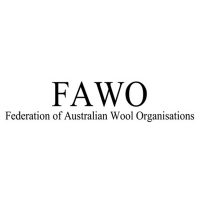
Media Release
The Federation of Australian Wool Organisations (FAWO) is a peak wool industry body whose Membership comprises AWEX, AWH, AWI, AWTA, and national Associations representing wool growers, brokers, exporters and processors. It represents Australia at the International Wool Textile Organisation (IWTO) and addresses wool industry issues of cross sector importance both locally and internationally. These include issues such as biosecurity matters.
FAWO achieved two major milestones at its Annual General Meeting last week.
Firstly, it passed a number of changes to its Constitution that are designed to encourage wider participation in its activities. These start with a change in name to Wool Industries Australia (WIA) and include other changes of a structural nature.
Secondly, it celebrated these changes with the organisation of a Forum in which its Member organisations were asked to speak about the impact of the drought on their sector of the industry. Over 70 people from growers to retail; and from the service sectors participated. Discussion was wide ranging and free flowing.
The commercial issues of having 12.1% less wool produced in 2018/19 and a further 5% less expected in 2019/20 are very apparent, as is the need for wool growers to purchase grain and hay to feed their sheep.
But, less apparent are the impacts of social and welfare issues on-farm and in rural towns, where there are less funds available for spending and for employment. Brokers referred to the personal impacts on their staff arising from their direct interaction with wool growers who are living with the drought. They also referred to the loss of expertise from the industry.
Also less apparent are the greater difficulties that wool exporters may have in meeting customers’ contract specifications, particularly for wool types that were not in large supply, even before the drought. This is given greater emphasis by the increasing demand from Australia’s customers for wools that meet traceability, sustainability and animal welfare requirements.
The importance of responding to this type of challenge was highlighted in a presentation to the Forum by Country Road CEO, Scott Fyfe. Country Road’s vision includes a “Responsible Wool Strategy”, which states:
“All Country Road’s pure wool and wool rich products will be fully traceable and certified by a credible third–party to ensure high animal welfare standards and sustainable farming practices by Winter 2025.”
Leading Italian processor, Giovanni Schneider described these issues as becoming more important than wool quality issues when speaking at the recent IWTO Congress in Venice.
The full presentations can be found at https://www.fawo.org.au/publications/
| David Michell | Bianca Heaney |
| Chairman | Secretary |
| 08 8209 4400 | 03 9311 0103 |